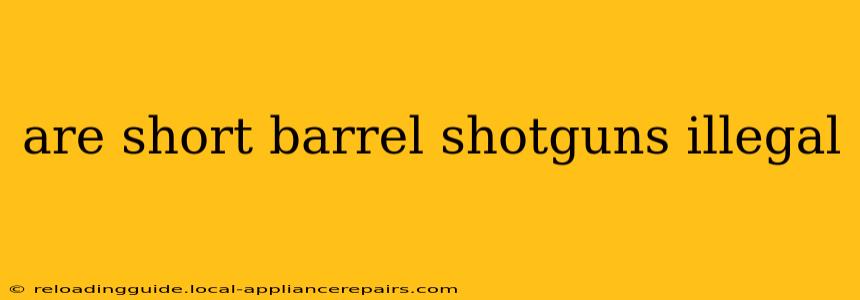Are Short-Barreled Shotguns Illegal? A Comprehensive Guide
The legality of short-barreled shotguns (SBS) is a complex issue, varying significantly depending on your location and specific circumstances. There's no simple yes or no answer. This guide will break down the legal considerations in the United States, as well as touch upon international laws, highlighting the importance of consulting local regulations.
Understanding the Definition of a Short-Barreled Shotgun
First, we need a clear definition. In the United States, the National Firearms Act (NFA) of 1934 defines a short-barreled shotgun as a shotgun having a barrel or barrels less than 18 inches in length. This is crucial because it triggers specific legal requirements and regulations.
US Federal Law and the National Firearms Act (NFA)
Under the NFA, owning an SBS is heavily regulated. It's not outright illegal, but it requires:
- Registration: You must register the SBS with the Bureau of Alcohol, Tobacco, Firearms and Explosives (ATF). This involves a complex process, including background checks and paying a significant tax.
- Serial Number: The SBS must have a serial number.
- Compliance with all other applicable laws: This includes state and local regulations, which can be even stricter than federal laws.
Failure to comply with the NFA can result in serious penalties, including hefty fines and imprisonment.
State and Local Laws: A Patchwork of Regulations
While federal law provides a baseline, individual states and localities can enact stricter regulations on SBS ownership. Some states may outright ban them, while others may have more restrictive licensing or permit requirements beyond the federal NFA stipulations. It's absolutely critical to research your specific state and local laws before even considering possessing an SBS.
International Laws: A Diverse Landscape
The legality of SBSs varies greatly across the globe. Many countries have strict gun control laws that prohibit or heavily regulate the ownership of short-barreled shotguns. Traveling internationally with an SBS is extremely complicated and often requires special permits and adherence to stringent regulations in both your home country and your destination.
Common Misconceptions
- "Any sawed-off shotgun is illegal": This is an oversimplification. While making a shotgun shorter to evade regulations is illegal, legally-manufactured and registered SBSs exist.
- "The NFA only applies to fully automatic weapons": The NFA covers a range of firearms, including SBSs, suppressors, and machine guns.
The Importance of Legal Counsel
Navigating the legal complexities surrounding SBS ownership is best done with the assistance of legal counsel. An attorney specializing in firearms law can provide accurate and up-to-date information tailored to your specific jurisdiction and circumstances. This is especially crucial if you are considering acquiring, manufacturing, or possessing an SBS.
Disclaimer: This information is for educational purposes only and should not be considered legal advice. Always consult with a qualified legal professional for advice on firearms laws in your jurisdiction. The laws surrounding firearms are complex and constantly evolving; relying on outdated or incomplete information can have serious legal consequences.

